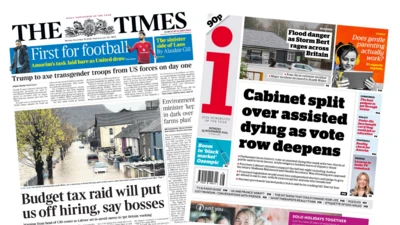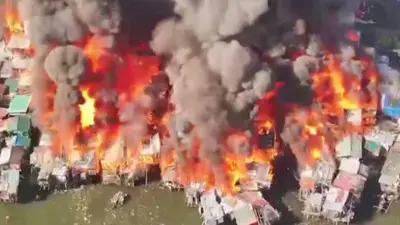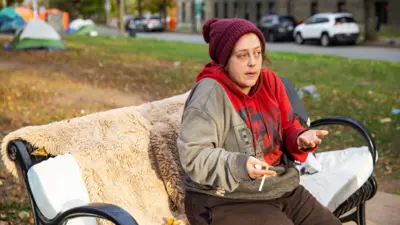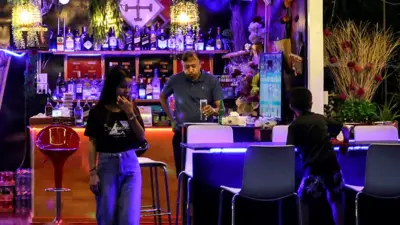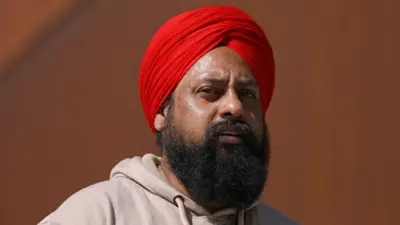We've updated our Privacy and Cookies Policy
We've made some important changes to our Privacy and Cookies Policy and we want you to know what this means for you and your data.
Capturing war-time memories, before it is too late
With every passing year, fewer of the men and women who helped defeat Nazi Germany and liberate Europe remain alive to share their stories. Before Remembrance Sunday - when the service and sacrifice of those who defended the country's freedom is commemorated - ҙуПуҙ«ГҪ News's Allan Little spoke to three veterans.
In 1943, an advert in the Daily Gleaner newspaper , "Britain needs you," caught the eye of a teenager growing up in Jamaica, Neil Flanigan.
"As loyal members of the Empire, we thought that it was good to go and help the mother country at a time when they were in distress," he says.
And he sailed across the Atlantic, in a group of ships, to join the Royal Air Force (RAF).
"The German U-boats were picking us off, sinking us," Neil says. "We thought nothing about our personal lives."
Neil is one of the last surviving members of the generation whose youth was defined by World War Two.
Another, Christian Lamb, 102, from London, was in France when war broke out.
"I'd gone there to improve my French," she says. "I got a telegram from my father, saying, 'War declared. Return home.'"
Back in the UK, Christian joined the Women's Royal Naval Service, known as the Wrens, and was posted to Belfast.
She worked as a plotter in a map room, tracking the progress of the North Atlantic shipping convoys as they tried to evade U-boat attacks.
One day, Royal Navy destroyer HMS Oribi arrived in Belfast for repairs.
"Half a dozen of us went down to have a drink on board - and there I met John Lamb, my future husband," Christian says.
Over the course of the Oribi's 10 days in port, John and Christian fell in love and became engaged.
But when Lt Lamb's ship left Belfast to join a convoy, Christian wondered whether she would ever see her fiance again.
Ahead of the 80th anniversary of the end of World War Two, in 2025, the ҙуПуҙ«ГҪ is trying to gather as many first-hand accounts from surviving veterans as possible, to preserve them for future generations.
Working with a number of partners, including the Normandy Memorial Trust and the Royal British Legion, the ҙуПуҙ«ГҪ has already spoken to many men and women who served during the War - you can watch their testimonies here.
Growing up in a Jewish family in south London, Mervyn Kersh, now 97, had been following news of Hitler and the growth of Nazi Germany since before the War.
"We knew what was happening to Jewish people under the Nazis - that was a big part of why I wanted to join up," he says.
Mervyn joined the Royal Army Ordnance Corps - and soon after his basic training, was heading to Normandy alongside an invasion force.
Meanwhile, the RAF had trained Neil in avionics - the electronic systems used on aircraft.
And he was stationed at bases across England, keeping bomber crews in the air.
"The Germans bombed us, day and night," Neil says. "People from the Empire and Commonwealth died - many of my colleagues who had volunteered to be aircrew and rear gunners and engineers
"It was ghastly as a young person watching death - but I had a job to do, to get out and maintain my aircraft to make sure they'd fly safely."
Image source, Neil Flanigan
In Belfast, Christian was tracking her fiance's convoy across the Atlantic, when it came under attack from German U-boats.
"They were involved in this terrible battle," she says. "My friends urged me to go home - but I couldn't possibly leave the scene. It was a matter of life and death for me. So I stayed, waiting for information, hoping."
Christian learned HMS Oribi had collided with a U-Boat and been damaged.
But she knew nothing of the crew's fate - until the ship eventually arrived in Boston and John was able to ring to tell her he was safe.
"There was nothing for either of us to say - just, 'Thank goodness, thank goodness, thank goodness,'" Christian says.
Image source, Christian Lamb
When Christian was posted back to London, she was given a top-secret role planning the D-Day landings, working from a windowless basement office in Whitehall.
"This was going to be the most extraordinary, enormous invasion ever seen in history," she says. "The whole of my office was covered with enormous maps of France.
"I didn't realise how important it was. I was sworn to secrecy. It was ingrained in us that we didn't even talk about it after the War - I didn't tell John till about 50 years later."
Image source, Mervyn Kersh
Mervyn crossed the English Channel three days after D-Day.
"That was the first time I really realised what I was going into," he says. "The adventure ceased to be an adventure and I became frightened.
"I had a prayer book with me, a Book of Psalms, which I did make use of, I must admit."
Mervyn took part in the liberation of Europe, as the Allied armies fought through France, Belgium, the Netherlands and into Germany.
"That was a marvellous feeling," he says. "Our name was the British Liberation Army, then we suddenly changed to the British Army of the Rhine. We weren't liberators anymore, we were conquerors."
Just days after its liberation, Mervyn arrived at the Bergen-Belsen concentration camp.
"I saw the people who were able to walk out," he says. "I spoke to dozens of them - mostly men in striped clothing. They were as thin as anything, thin faces, the arms just bone. It was very moving.
"I gave them my chocolate ration - it was only weeks later that I learned chocolate is the worst thing you can give someone who hasn't eaten."
They are a remarkable generation.
The courage and sacrifice of their youth bequeathed to those who came later, these veterans shaped the world we grew up in.
But few are still alive.
The youngest are now in their late 90s, while some - such as Christian - are centenarians.
It seems more important than ever to listen to their stories and record their reflections for future generations.
After the War, Mervyn spent time as a door-to-door salesman - a job he did not enjoy.
Later, he worked for many years as a freelance journalist.
Christian married John, wearing a wedding dress bought by her mother from a war-time catalogue.
The couple had a family and, in her 80s, Christian began a successful career as an author - writing books on botanical history, as well as a war-time memoir.
Neil settled in the UK and raised a family here.
He was appointed an MBE in recognition of his service to his community.
"I think I made a contribution in some small way," he says, "to make Britain safe and sound today, a country that I still live in and enjoy."
Do you or someone you know have memories of World War Two? Please share these experiences by emailing haveyoursay@bbc.co.uk.
Some of the stories collected may be shared with our partners and used on ҙуПуҙ«ГҪ News platforms.
Please include a contact number if willing to speak to a ҙуПуҙ«ГҪ News journalist.
You can also contact ҙуПуҙ«ГҪ News in the following ways:
- WhatsApp: +44 7756 165803
- Tweet:
- Upload pictures or video
- Please read the terms and conditions and privacy policy
If you are reading this page but cannot see the form, visit the ҙуПуҙ«ГҪ website's mobile version to submit a question or comment, or email HaveYourSay@bbc.co.uk.
Please include your name, age and location with any submission.
Top Stories
More to explore
Most read
Content is not available

